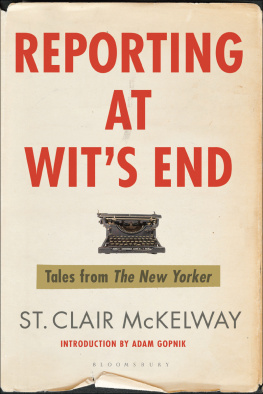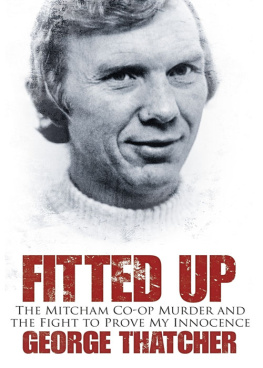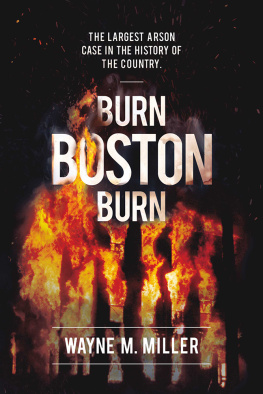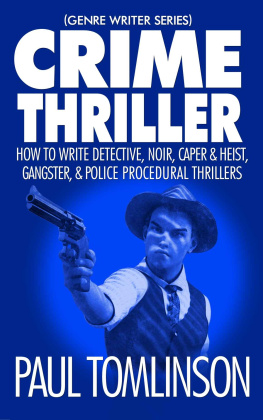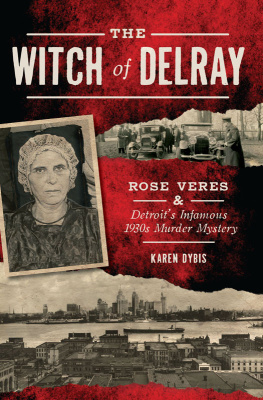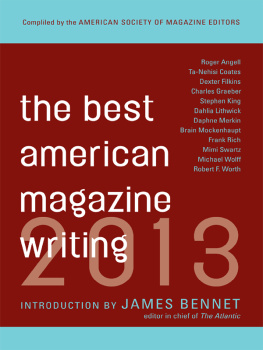REPORTING AT
WITS END
REPORTING AT
WITS END
Tales from The New Yorker
St. Clair McKelway
Introduction by Adam Gopnik

Compilation copyright 2010 by the Estate of St. Clair McKelway
Introduction copyright 2010 by Adam Gopnik
All rights reserved. No part of this book may be used or reproduced in any manner whatsoever without written permission from the publisher except in the case of brief quotations embodied in critical articles or reviews.
For information address Bloomsbury USA, 175 Fifth Avenue,
New York, NY 10010.
Published by Bloomsbury USA, New York
The pieces in this collection were originally published, sometimes in somewhat different form, in The New Yorker, and in the books Gossip:
The Life and Times of Walter Winchell, True Tales from the Annals of Crime andRascality, The Edinburgh Caper, and The Big Little Man from Brooklyn.
All papers used by Bloomsbury USA are natural, recyclable products made from wood grown in well-managed forests. The manufacturing processes conform to the environmental regulations of the country of origin.
Library of Congress Cataloging-in-Publication Data
McKelway, St. Clair.
Reporting at wits end : tales from the New Yorker / St. Clair McKelway; introduction by Adam Gopnik.1st U.S. ed.
p. cm.
eISBN: 978-1-60819-123-9
I. Gopnik, Adam. II. New Yorker (New York, N.Y. : 1925) III. Title.
PS3525.C54R48 2010
814'.52dc22
2009028891
First U.S. Edition 2010
1 3 5 7 9 10 8 6 4 2
Typeset by Westchester Book Group
Printed in the United States of America by Worldcolor Fairfield
CONTENTS
The pieces in this book all appeared originally in The New Yorker, and appear here arranged by the decade of their first publication. The Cigar, the Three Wings, and the Low-Level Attackswas the third of a four-part series of articles that appeared in the New Yorker in 1945 under the heading A Reporter with the B-29s. Gossip Writer, St. Clair McKelways six-part profile of Walter Winchell (the first part of which appears here),and The Edinburgh Caper were later revised and expanded into the books Gossip:The Life and Times of Walter Winchell (1940) and The EdinburghCaper: A One-Man International Plot (1962). McKelway also revised and updated many pieces for publication in two collections of his work, True Tales from the Annals of Crime and Rascality (1951) and The Big Little Man from Brooklyn (1969). Reporting at Wits End preserves, as far as possible, the original spelling, punctuation, and style of all the pieces; those that appeared in the1951 and 1969 collections reflect McKelways own revisions. Minor changes were made only where necessary for consistency within pieces and the sake of clarity.
The title Reporting at Wits End derives from the New Yorker heading under which The Blowing of the Top of Peter Roger Oboe appeared in 1958: That Was a Reporter at Wits End.
INTRODUCTION
REDISCOVERED SAINT
ADAM GOPNIK
St. Clair McKelway is a New Yorker author of the Golden Ageokay, one of the Golden Ageswhose work, out of print for a long time, is now mostly unknown and overlooked (the temporary condition of most good writing, so no big deal there.) He was a standby on the magazine from the mid-thirties to the mid-sixties, with a significant break in the forties when he worked as a public relations officer in the Air Force, rising to the rank of lieutenant colonel, in the Pacific. Through all that time, he was as well known to New Yorker subscribers as any of the writers whose names are more familiar now, as well known and as keenly relished by readers as Liebling and Mitchell and White and those few others whose reputations have been rehabilitated, as they liked to say in the old Soviet Union, by the suffrage of readers and the backward looking hopes of publishers.
McKelway could do it allcomment, stories, profiles. He was especially skilled as a rewriter of other peoples troubled stuff, a gift that helped save The New Yorker career of the great A.J. Liebling. But he was most famous for his pieces about odd crimes and strange criminals: imposters, rascals, embezzlers, con men, counterfeiters, and the like. In those saner days, publishers were willing to put out barely veneered collections of magazine pieces without a pretense of more than minimal thematic unity, and so McKelways pieces could be found in books as well as in the magazine. Thats where I found him first, actually, in an old edition of his 1951collection True Tales from the Annals of Crime and Rascality, which Mark Singer, the master Talk of the Town hand of the time, loaned me when I was a young pup reporter beginning to write Talk, too.
There were so many of these that a McKelway crime story was as much a signature item as a Trillin murder piece is now. What made McKelways pieces so startling, and so much better than, say, Herbert Asburys romantic crime books, was the solidity of their reporting, their reliance on assembled fact, and the charm of their tone. They are thorough without being dull, and funny without feeling forced; crime reporting drained of melodrama and sensation, those tabloid things replaced with sly irony, wit, a love of detail, and a feeling for the sad realities of human character. McKelways are fact-based pieces that have, as reviewers like to say, the excitement and surprise of fictiononly not of big fiction, but of exquisitely shaped small fiction, of an OHara story. All set in New York, and all bending toward some odd edge of character revelation, they render the outer edges of experience as the normal shape of life.
McKelway wrote about process servers and insurance men and embezzlers and imposters with a clear hard edge that allowed for a curious kind of compassion. Firebugs are dangerous and have to be suppressed, but they are otherwise normal men who just happen to be in love with the look of flaming warehouses. He was an admirable man except for that one quirk, the embezzlers wife says about McKelways embezzler, the Wily Wilby, and the reader accepts the judgment. Quirks of the higher and odder kind are McKelways real subjectwith the understanding that a quirk of distinction is simply a quiddity, and life is made up of those.
McKelways is a New York still largely middle class and lower middle class in make-up, where the cops and process servers and fire inspectors came from essentially the same immigrant pool of Irishmen and Italians and Jews as the small time crooks and insurance defrauders and firebugs. Its the prose reality of Damon Runyons poetic dream world. McKelways stories are not exactly three dimensionaltheir cartoonish clarity and stenographic elegance are part of their charmbut they bear the same relationship to Runyon, or to tabloid newspaper reporting, that Peter Arnos cartooning does to a newspaper comic strip. They are deceptively simple, not simply deceptive.
Where the great Joe Mitchells gift was for urban fable, McKelways was for the short, significant parable. His stories arent illustrative of trends or tendencies in modern crime or modern manners. He takes it for granted that there will always be more or less the same number of firebugs and coiners and for that matter crazy generals, and that, apart from their vocational oddities, they will always be in other respects like the rest of us. The typical magazine trend piece says, almost always falsely, More and more people are acting this way! The classic McKelway piece says, accurately, Very, very few people act this way, which is what makes the ones who do so interesting. This belief in the thing for its own sake, which was shared by his generation of
Next page
